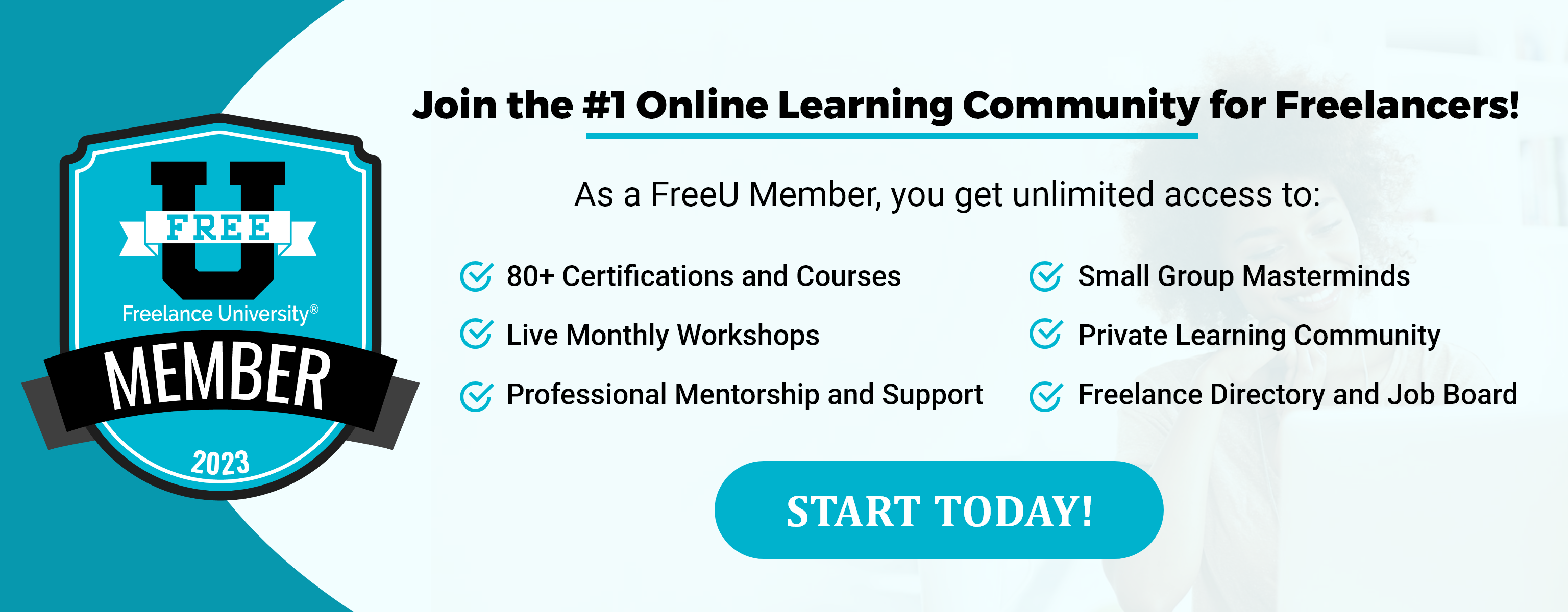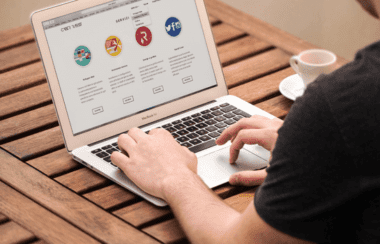Five Ways to Create a Winning Entrepreneurial Mindset
By Jena Kroeker

In a book called Mindset: The New Psychology of Success, Carol Dweck says,
“The view you adopt for yourself profoundly affects the way you live your life. It can determine whether you become the person you want to be and whether you accomplish the things you value.”
In your freelance business, are you the person you want to be? Are you accomplishing the things you value? As virtual business owners, we are entrepreneurs, but do we always think and act like entrepreneurs?
Sometimes we might catch ourselves behaving as employees, especially when we’ve come from or are still working in the corporate world. And chances are at some point in our younger days we were employees, even if it meant working a summer job at an ice cream shop.
In our FreeU training, co-founder and instructor Craig Cannings defines entrepreneurs as having a “growth mindset.” This type of mindset is characterized by qualities like problem-solving, adaptability, decisiveness, leadership, optimism, and many more. He also stresses that if we don’t want our clients to treat us as employees, we need to set the tone from the beginning.
But how do we set that tone? I think that we need to start with ourselves. We need to believe that we’re entrepreneurs before we can act like entrepreneurs.
To help us win the tug of war between our employee and entrepreneur sides, here are five ways we can create a winning entrepreneurial mindset:
1. Choose Your Words Wisely.
We often relate this advice to how we speak to other people, but in this case it applies to how we speak to ourselves. To foster an entrepreneurial mindset, it helps to think and speak in entrepreneurial language. If you’ve worked in the corporate world in Human Resources, for example, you may be able to identify many “employee/employer” words.
For the purposes of this blog post, I’ll share a few words and phrases that I and other freelancers may say or think about, along with some possible alternatives:
– Instead of “employer” or “boss,” say “client.”
– Instead of “job,” say “business opportunity” or “service.”
– Instead of “failure” or “mistake” say “learning opportunity.”
– Instead of “working for” your client, say you are “working with” your client.
– Instead of “change,” say “transition,” “new chapter,” or “new journey.”
– Instead of “problem,” say “challenge.”
– Instead of “worker,” say “business owner.”
The list goes on and on. As you travel on your entrepreneurial journey, you may come across instances where you find yourself speaking and thinking like an employee. For almost 18 years, I submitted what I called a “resignation letter” to my clients when I ended a contract. Then a couple months ago I discovered that the more entrepreneurial way of describing it was not “resignation letter” but “written notice.”
So, be prepared to learn more entrepreneurial words along the way and incorporate them into your self-talk.
2. Employ Yourself with Tools.
If you’ve been an online professional for a while, you may already have collection of software that helps you run your business. When you look closely at these tools, you’ll find that they also help you think like an entrepreneur:
– Project Management Software like Trello (https://trello.com/): You’re setting vision and goals for your business.
– Accounting Software like FreshBooks (https://www.freshbooks.com/): You’re responsible for what happens in your business.
– Client Onboarding Tools like 17hats (https://www.17hats.com/): Your client is not your employer, and you’re creating healthy boundaries and expectations.
– Conferences and Online Training: You’re committed to continuous learning.
– Time Tracking Software like Toggl (https://toggl.com/): You’re making good use of your time and optimizing your productivity.
When you think of the apps and software in your business, take a moment to identify how they illustrate your leadership, vision, and goals as a business owner. Observing these qualities will help shape your view of yourself.
3. Schedule Your Communication.
When your client emails you, do you jump to attention and write him or her back right away? Many of us may carry a feeling left over from the days when we needed to be at our employer’s beck and call. Maybe you worked in an office where someone would come over to your desk and summon you to a meeting. Maybe your employer would walk by your desk and deposit a pile of papers for you to process immediately. Or maybe you worked on call and had to keep your phone by your side at all times.
As an entrepreneur and online business owner, you’re free to decide when you’ll answer messages and respond to requests. You may need to read that sentence again and repeat it to yourself, because it can be a tough one to accept. But to embrace an entrepreneurial mindset, you need to give yourself permission to communicate on your terms.
Here are some ways you can communicate as an entrepreneur and still serve your clients well:
– Decide on a reasonable response time and let your client know when they can expect a reply from you (e.g. within 24 hours, unless you’ve prearranged to be more responsive during busy times like a product launch).
– Decide how you’ll communicate with your client (e.g. which types of communication you’re comfortable with and which are off limits).
– Batch your emails and other messages so that you respond during the time frame you choose and give your full attention to answering requests.
– If possible, turn off your device notifications while you’re working on other tasks so you aren’t tempted to respond immediately.
This strategy can take a lot of work, but try to be consistent. As long as your client is aware of your prearranged response time, they won’t worry that you’ve dropped off the face of the earth.
4. Govern Your Own Work Schedule.
In addition to scheduling your communication, you are free to schedule your own work times as an entrepreneur. Good clients who are aware of the entrepreneurial mindset often reflect it in their requests. For example, they may say things like this:
– “I’d like an article written on such and such. What is a reasonable time frame for you to complete this project?”
– “I’ve sent you such and such pieces of content. When you have a moment, could you please review them and send me any revisions?”
– “I’d like to hire you for a consultation. Are you available on such and such a date?
When they word things this way (and even if they don’t), give yourself permission to decide what time frames work best for your business. If you do consulting work, tools like Acuity Scheduling also give you freedom to block out times when you’re not available.
Embrace this freedom, and you’re embracing an entrepreneurial mindset. Unlike the days when you needed to submit a vacation request to Human Resources or to your employer, you make the call as a virtual business owner. Of course, there may be circumstances where you schedule vacations to work around your clients’ busy times, but remember that is always your decision.
5. Enrich Your Client Relationships.
I remember times when I worked as an employee, and I strictly followed the rules and performed tasks just to finish them. In an office, I would file papers and never stop to consider whether the filing system could be improved. I contributed nothing beyond following orders.
If there was a problem (which I’d think of as a problem and not a “challenge”), I’d rely on my employer to fix it. Or I’d take his or her advice on how to fix it, without offering any suggestions or stepping outside the box to find a solution.
In an article titled “6 Tips For Growing With An Entrepreneurial Mindset,” Arash Asli says that “by treating tasks as problems to be solved — and thinking about how you can provide value at every single turn — you can continually put the entrepreneurial mindset into practice.”
So, instead of merely completing an ebook project, an entrepreneur would take the client’s suggestions and consider whether there are other ways to add value to it. If a challenge arises, entrepreneurs may consult a client but also embrace the freedom to make suggestions of their own.
And when it comes to mistakes (or learning opportunities), I like this advice given by Jayanth Sharma in his article “How to Build an Entrepreneurial Mindset”:
“Successful entrepreneurs never imagine that they are perfect and know it all. Their curiosity for knowledge and their motivation for self-improvement transcend any setback that a mistake can create. Mistakes are opportunities to understand yourself and the problems in your approach or your implementation. As long as your intentions are correct, making mistakes and persistently trying to resolve them lead to better growth as an individual.”
Creating a winning entrepreneurial mindset is a process that may last throughout your freelance career. It starts with your own perspective and then flows through your behavior to your relationships with clients and colleagues. And by embracing this mindset, you’re sure to become the business owner you’ve always wanted to be!
How do you create an entrepreneurial mindset in your freelance business? Do you find it challenging to shed the attitude of an employee? Please share your thoughts in the comments below!









































































































